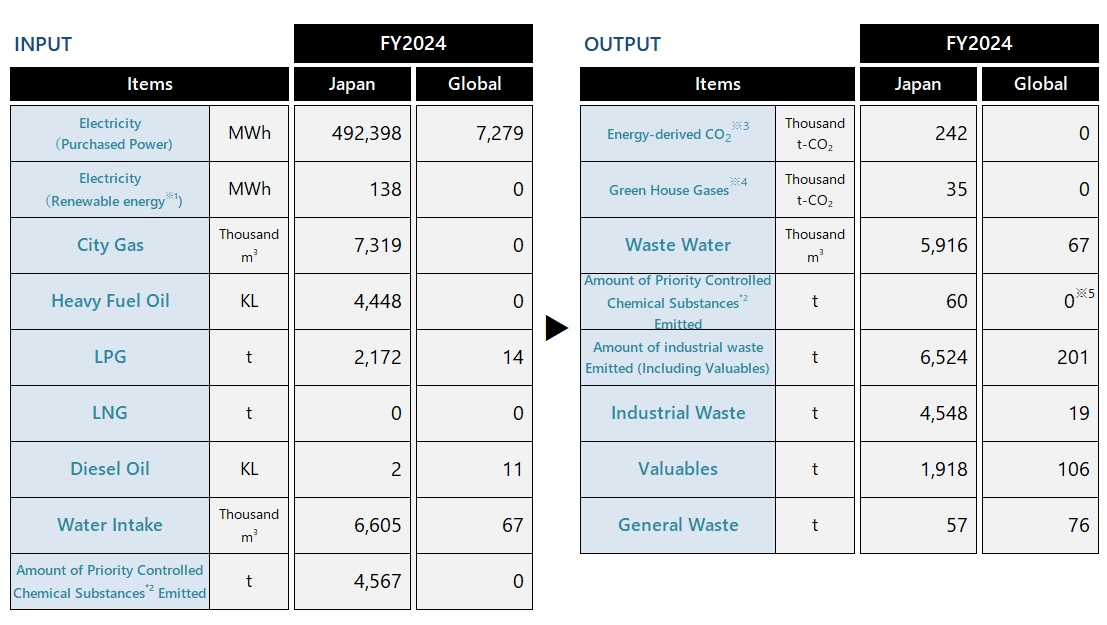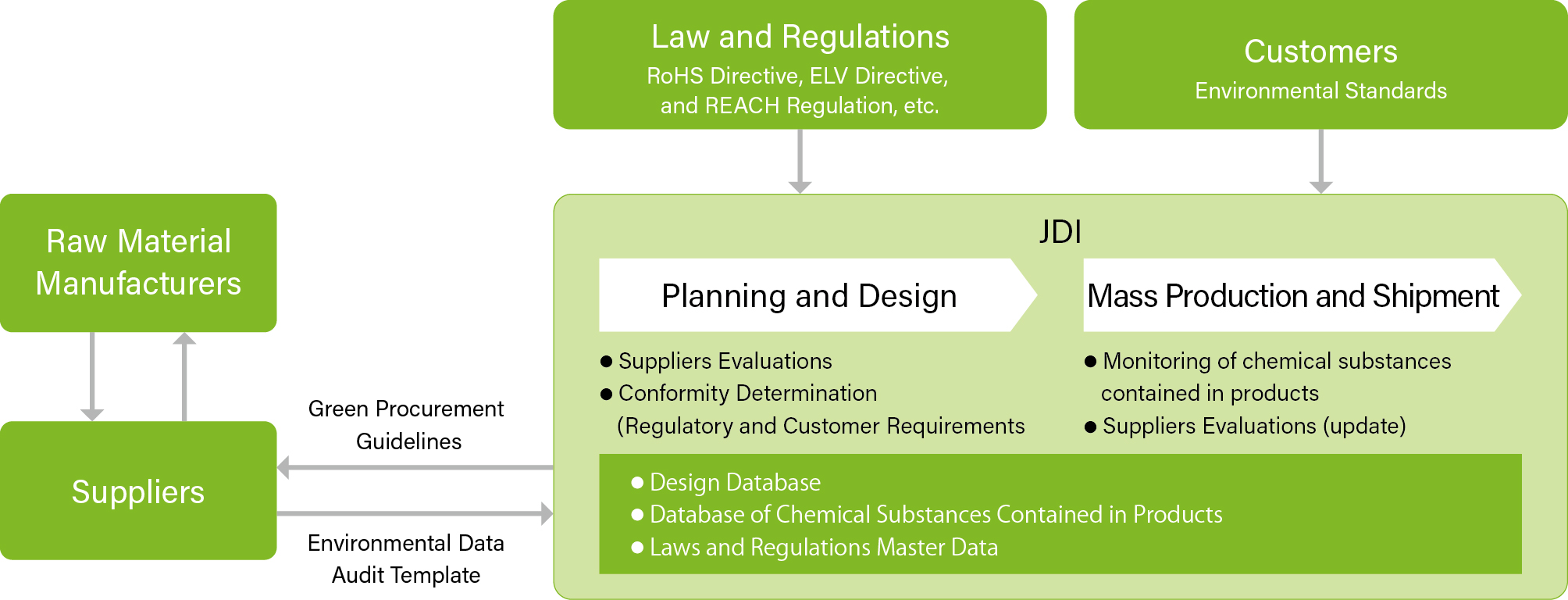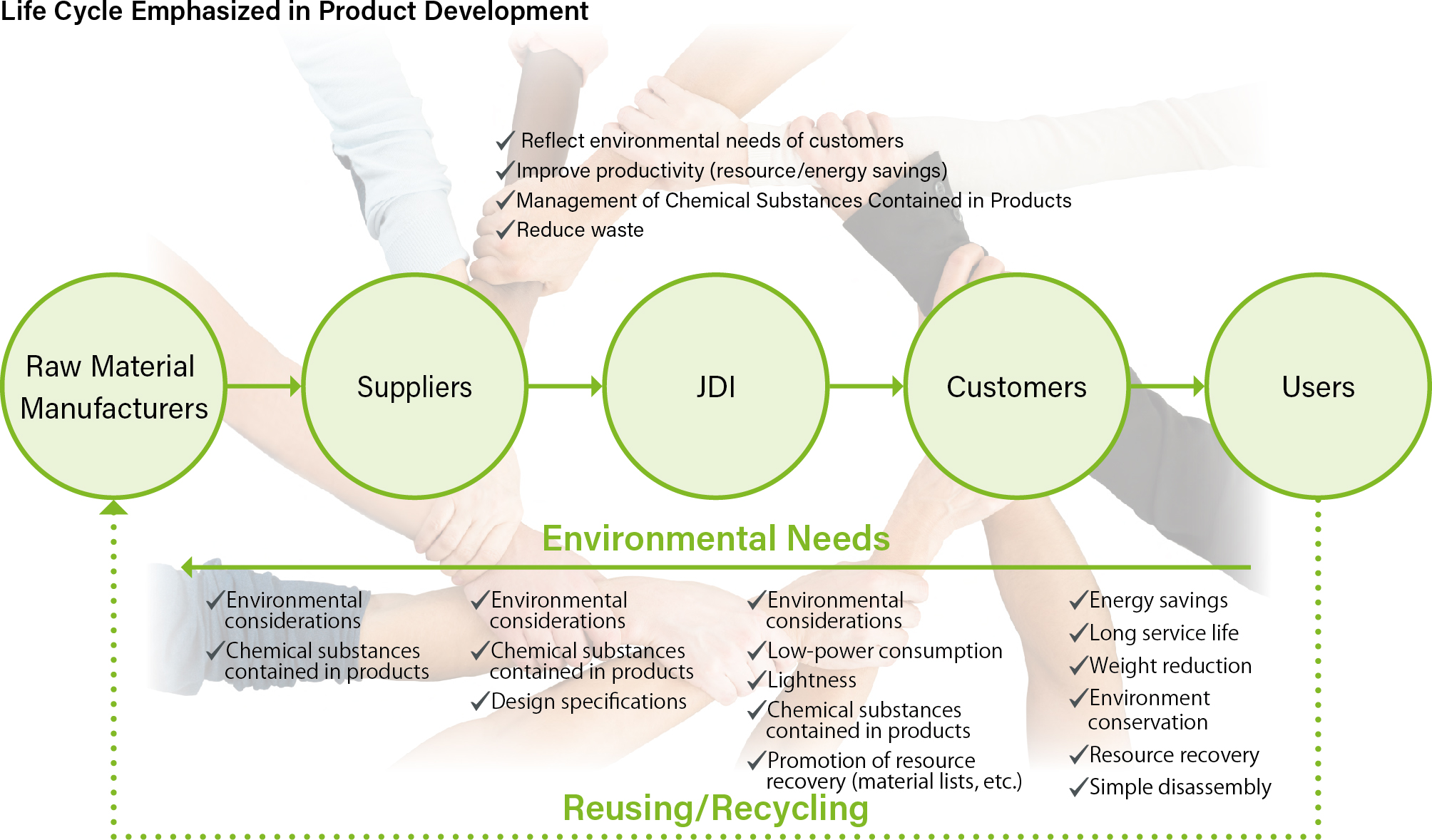-
Environmental Controls


Environmental Impact
JDI’s business activities consist of inputting energy and resources for product production, which are accompanied by outputs such as CO2, waste, and so on. An overview of this is shown in the following diagram (covering all domestic Fabs global manufacturing subsidiary in FY2023). The basis of JDI’s environmental improvement activities lies in reducing the amount of input and output, and JDI works to address such activities by comprehending each of these items for every area in a detailed manner.

*1 Includes solar power generation as well as deemed renewable energy through non-fossil certificates and similar mechanisms.
*2 The priority controlled chemical substances refer to substances selected as being subject to priority control efforts.
*3 The CO2 emissions factor from electrical power in Japan is based on 0.423 t-CO2/MWh (emissions factor released by each power company [factor used to convert greenhouse gas emissions of a specific emitter]). The other conversion factors are from the Act on the Rational Use of Energy and the Act on Promotion of Global Warming Countermeasures. The CO2 emission factor overseas uses the local emission factor.
*4 Among substance covered in the Act on Promotion of Global Warming Countermeasures, JDI uses the term “greenhouse gases” to refer to these seven substances: PFC (CF4, c-C4F8), HFC (CHF3, C2HF5), SF6, NF3 and N2O. Emission factors of AR5 are used.
*5 Within Japan, this refers only to emissions of the priority controlled chemical substances designated by JDI, and for overseas it refers only to emissions of VOC.
Chemical Substance Management
Our products contain a variety of chemical substances, some of which are considered hazardous and pose a risk of environmental contamination. To prevent this, numerous laws and regulations have been enacted in countries around the world. In addition to complying with these laws and regulations, we also manage chemical substances appropriately at every stage of design and manufacturing to meet customer requirements.
Management of Chemical Substances Contained in Products
Based on laws and regulations, including the RoHS Directive, the ELV Directive, and the REACH Regulation, as well as requests from JDI’s customers, JDI manages chemical substances contained in products with the understanding and cooperation of JDI’s business partners. JDI has also established a control method that considers the risk of chemical transfer to products from indirect materials, such as jigs, fixtures, tools, and equipment that come into direct contact with products during manufacturing, and verifies that no restricted substances are used. We compile these items into a database and confirm that our products comply with laws and regulations and customer requirements at the design stage before they are shipped to our customers.

Management of Chemical Substances
We manage chemical substance control based on the following basic principles
Compliance with Laws and Regulations
JDI has established a system to comply with regulations related to the chemicals JDI uses and those contained in JDI’s products. JDI not only complies with these regulations, but also monitors the use of chemicals in accordance with customer requirements.
In addition, JDI regularly monitor major environmental burden substance regulatory trends in Europe, the US, and Asia, and take proactive measures to meet future standards. At the 12th Conference of the Parties (COP12) to the Stockholm Convention on Persistent Organic Pollutants (POPs), held in April 2025, medium-chain chlorinated paraffins (MCCPs) and long-chain perfluorocarboxylic acids (LC-PFCAs) were newly added to Annex A (Elimination). In advance of these regulations, JDI have voluntarily prohibited the inclusion of these substances in newly adopted products. JDI will continue to monitor regulatory trends and take appropriate responses as necessary.
Measurement of Chemical Substances and Use of Analysis Results
JDI regularly measures the chemical substances contained in its atmospheric emissions and discharged wastewater. JDI also require JDI's suppliers to conduct detailed analysis of specific parts and materials to prevent accidental contamination with prohibited substances. As part of our internal management, we use XRF measurement equipment at each manufacturing site to monitor whether or not prohibited substances are contained in specific parts and high-risk substances, and we strive to prevent their contamination.
JDI monitors the use of chemical substances and promotes the reduction of discharged amounts of chemical substances in order to respect biological diversity and contribute to the preservation of the environment and a sustainable society.
Green Procurement and Environmentally Friendly Products
JDI has established the Green Procurement Guidelines and conducted evaluations of JDI's suppliers management systems to ensure proper operation as well as convey the information on laws and regulations and customer requirements to our business partners and ask these business partners to comply with them. Through promoting these initiatives and JDI’s activities to reduce environmental impact, we are striving to design and produce environmentally friendly products.
Green Procurement Efforts
-
1.Enactment of Green Procurement Guideline
JDI enacted its Green Procurement Guidelines to reflect both legal restrictions in various countries and regions on the chemicals contained in products and JDI’s customer requirements, and asks its business partners to comply with them. The Green Procurement Guidelines are reviewed annually and are disclosed on JDI’s website. JDI will continuously comply with laws and regulations and make every effort to control chemical substances contained in JDI’s products.
-
2.Evaluation of Business Partners’ Management Systems for Chemical Substances in Products
JDI asks it's suppliers to establish a management system for the chemical substances contained in raw materials and other procured items in line with the Guidelines for the Management of Chemical Substances in Products set by the Joint Article Management Promotionconsortium (JAMP). The status of such system is confirmed by the system that links JDI's suppliers (jDesc Survey Site). Regarding the suppliers whose systems do not meet JDI standards, we ask them to correct and improve their management systems.
Environmentally Friendly Products
At JDI, we strive to design, develop, and manufacture products together with business partners who share the values of environmental protection and the realization of a sustainable society, in order to meet the environmental needs of our customers, recognizing that our products are part of the life cycle of the products our customers place on the market.
JDI contributes to the realization of a sustainable society through business activities that include incorporating customers’ environmental requirements into JDI’s products, procuring materials from trustworthy business partners, and increasing JDI’s productivity. JDI’s efforts to preserve the ecosystem even extend to the local region around each fab.

Minimizing Environmental Risks
Compliance with Regulations at JDI Fabs
JDI is committed to strict compliance management within its environmental management system. Regular measurement and management of wastewater, exhaust gases, noise, vibration, and odor are carried out, and in the event of any significant violations related to the environment, JDI ensures horizontal deployment to related sites to prevent recurrence.
FY2024, there were two instances of environmental violations in Japan, but JDI promptly and appropriately responded, implemented measures against the causes of the occurrences, and pushed forward with efforts to prevent recurrence. JDI will continue to strive for further thoroughness and maintenance of compliance management.
Compliance with Regulations in Products
JDI controls the use of chemical substances in manufacturing and other processes under internal rules categorized in accordance with legal regulations. JDI manages the use of chemical substances contained in products in accordance with the RoHS Directive, REACH, and other laws and regulations, as well as through green procurement. The same style of management is also used at JDI's global manufacturing subsidiary to prevent environmental contamination, respond to statutory requirements, and reduce the environmental load.
Responding to Climate Change
JDI strives to understand and recognize all impacts related to climate change that affect JDI, as well as the needs and expectations of stakeholders and related parties, and applies this understanding throughout the company as part of its environmental management system. Along with these activities, JDI positions climate change measures as an important initiative. JDI analyzes the risks posed by climate change, the various scenarios expected in the future, the certainty of strategies, and the continuity of business under their impact, in line with the scenarios of global initiatives. JDI is committed to disclosure of this information.
